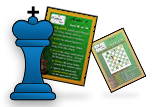Chess Club programs
Coaching programs with Northern Star
Northern Star Chess coaches are supported in our work by our qualified FIDE Trainer advisor, from coach training to coaching materials used. This ensures consistency and quality across our coaching programs.
Quick Links
During school days
Chess as part of the school curriculum
Northern Star Chess coaches attend the school on days when the special program of chess is conducted.
There are many different ways to run chess as a specialist program. Here are some examples from schools currently offering chess in their curriculum:
- Offer chess to some or all students. For instance, offer this for all grades 3 and 4, or all grades 5 and 6. In secondary schools, offer chess as one of the end of year activities in years 7 and 8, or one of the electives in years 9 and 10.
- Tailored coaching courses for different year levels. For instance, Beginner-Intro classes for the more junior years (where they learn the basics of chess with special games and activities), and more advanced tactics and theory for the higher year levels.
- Offer chess for part of the school year. Terms 2 and 3 are popular choices, as indoor activities are more attractive during the winter months.
Primary Chess Fest Programs
NSC is committed to providing the chess experience to as many students as possible. We offer this very popular and very affordable chess program to schools.
- The school nominates a number of classes of students for participation. Typically this would be one or more year level. For examples, all grade 3/4 students.
- NSC coaching staff attend weekly sessions with each class for 4 weeks. Students are taken from the beginning and learn the basics of the game
- After the 4 weeks of coaching classes, students participate in a Chess Fest Day where they play in a tournament set up amongst all students in the program. This is their introduction to the chess tournament experience.
School chess club
Chess clubs at school
- Coordinated at the school during school terms, typically at lunchtime or after school
- Up to 20 students per group
- Flexible scheduling to accommodate various timetable commitments each term


